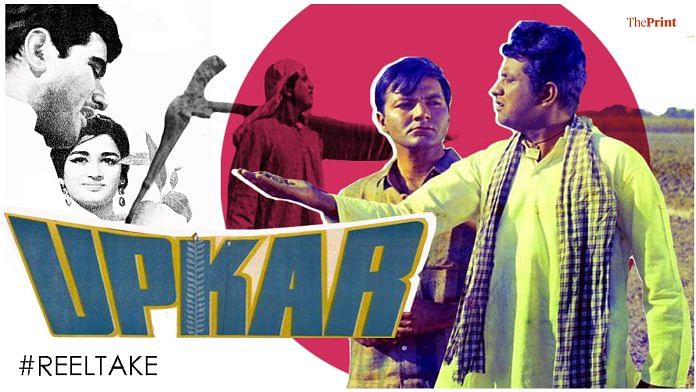New Delhi: Of the many celebrations to hail the first-ever Olympic gold by India in athletics, one stood out. As javelin thrower Neeraj Chopra clinched the top spot at the Tokyo Olympics last week, cricket legend Sunil Gavaskar — watching Chopra while on the broadcast panel for the ongoing India-England test series — got up on his feet to clap and sing ‘Mere desh ki dharti sona ugle’.
More than 50 years since it was released as part of the soundtrack for the Manoj Kumar-starrer Upkar (1967), the song remains an anthem of patriotism. It is played every Independence Day at celebrations around the country, including in schools, and ahead of the Republic Day parade at Rajpath.
Upkar was Manoj Kumar’s directorial debut, and ushered in a new genre of patriotic films that earned him the nickname ‘Bharat Kumar’.
The film was released two years after the 1965 war between India and Pakistan, a time when India was also dealing with a food shortage, prompting the then prime minister Lal Bahadur Shastri to appeal to citizens to observe a day’s fast every week.
The idea of the film is believed to have originated at the premiere of Shaheed (1965), another Manoj Kumar film. Shastri had suggested that a film be made embodying his slogan of ‘Jai Jawan, Jai Kisan’, that celebrated the soldier as well as the farmer.
Upkar represents the issues the nation, a newly independent republic, was faced with at the time. It celebrates rural India, and depicts the temptations that may trigger greed.
The futility of a blind pursuit of money is among its many messages. Another message is that citizens can face hardship with stoicism.
While a movie of its times, Upkar’s theme — celebrating the contribution of the soldier and the farmer — ring familiar as India deals with Chinese aggression on its border, and the protests against the farm laws refuse to abate.
Farm life versus city life
The film opens with a village woman Radha (Kamini Kaushal) trying to raise her two sons, Bharat (Manoj Kumar) and Puran (Prem Chopra) after their father is killed by their uncle Charan Das (Madan Puri). Bharat and Puran want different things in life. While Bharat toils on the farm and saves money to educate his younger brother, Puran goes to the city to study medicine.
Puran returns to his village after completing his education but has somehow been influenced by the lifestyle of urban India. In the city, he has also changed his name to a more fashionable one — Kumar. The film features actor Pran as Malang Chacha, a physically challenged and upright farmer, a character very different from his usual flamboyant villainous roles.
Asha Parekh plays a young doctor named Kavita who is Puran’s classmate. She leaves her comfortable city life behind to be a village doctor. Kavita meets Bharat in the village and is smitten with him. She is drawn to his simplicity and idealistic values even though Puran likes her. When Puran realises that Bharat and Kavita are in love with each other, he starts to hobnob with his uncle Charan Das and the village moneylender Lala Dhaniram, who further provoke him against his brother, and force him to demand his share of land.
Bharat signs over the entire property to his brother and goes on to fight the India-Pakistan war as a soldier. He is severely wounded. Will Puran realise his mistake and be a ‘good brother’ or will he ultimately pursue individualistic dreams in a city? The film answers this right at the end.
Also read: Footpath — the 1953 Dilip Kumar movie that still holds a mirror up to society
‘Faith in the plough’
‘Jai Jawan, Jai Kisan’ is clearly the central thought behind the film. In the film, a memorable encounter takes place between an Army Major and Bharat Kumar on the latter’s farm. The major places his gun over the plough and says, “Bandook mera vishwas hai aur hal tumhara vishwas hai, aur aaj yeh dono is desh ka vishwa hain (I have faith in my gun and you have faith in your plough, and together, the nation has faith in both).”
The film manages to successfully represent as well as romanticise rural India. Based on the famous Gandhian statement — India’s future is in its villages — the film does a good job of depicting farm life. Lush green fields, silhouettes of village women walking with water pots over their heads in straight lines, beautiful sunset scenes — the film is a visual delight.
The film not only dealt with the issues of grain shortage, hoarding, and black marketing, it also attempted to address population growth and lack of good healthcare in the villages. The concept of an idealistic city doctor going to the village to work seems to have articulated the nation’s expectation of urban youth at that time — a theme Phanishwar Nath Renu also took up in his famous Hindi novel ‘Maila Aanchal’.
The current generation might find the film too idealistic or full of virtue-signalling. But it was well-received during those years and gave Manoj Kumar a formula for success. Upkar‘s success also owes a great deal to Kalyanji Anandji, lyricists Qamar Jalalabadi, Indeevar, Gulshan Bawra, and Sitaram Dhawan, and, of course to singer Mahendra Kapoor, who sang its most famous number — Desh ki Dharti.
‘Kasme waade, pyar wafa sab’, sung by Manna Dey, and ‘Aayi Jhoomke Basant’, voiced by Mahendra Kapoor, Shamshad Begum and Asha Bhosle, were among the film’s other noteworthy songs.
(Edited by Paramita Ghosh)
Also read: 5 songs to remember Shakeel Badayuni, Hindi cinema’s romantic poet



